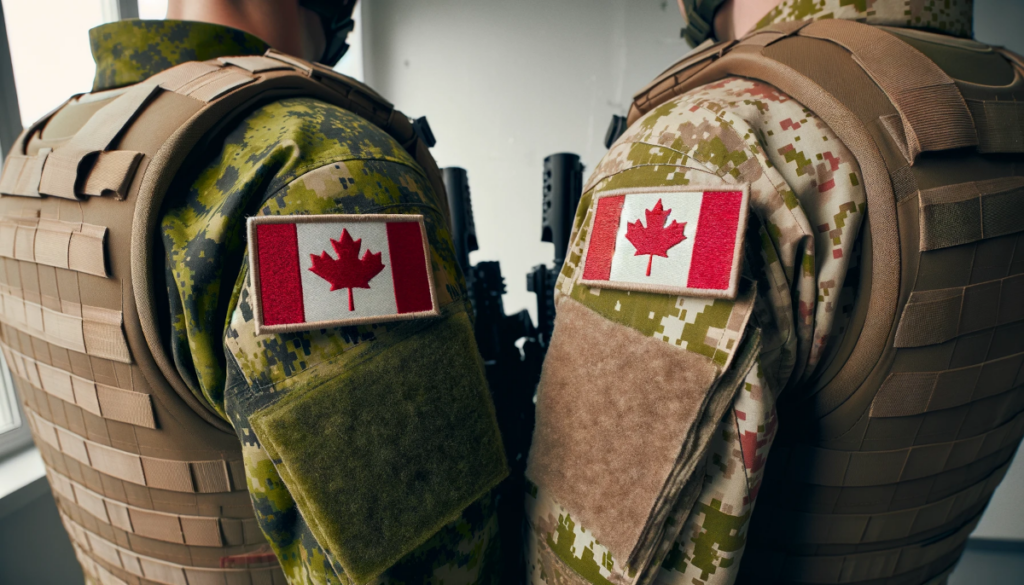A “food pantry” was established by staff for financially burdened troops to prevent hunger amid their intensive cyber training sessions.

Canadian flag shoulder patches on army armed forces uniforms. DALL-E
In the heart of Canada’s capital, a group of Canadian Forces personnel embarked on specialized cyber training, only to find themselves facing unforeseen hardships. Tasked with the critical mission of bolstering the nation’s cyber defenses, these soldiers encountered a stark reality far removed from the battlefield yet equally challenging.
Upon their arrival in Ottawa for training at Willis College, these military recruits were met with an unwelcoming reality. The anticipated support from the Canadian Armed Forces (CAF) failed to materialize, leaving them to grapple with the city’s soaring living costs. The absence of a housing allowance further exacerbated their situation, thrusting them into financial distress.
The dire circumstances led to extraordinary measures. In a striking testament to the community spirit, Willis College staff established a food cupboard. This initiative provided a lifeline for the financially strained personnel, ensuring they did not go hungry. The move underscored the acute challenges faced by the recruits, challenges that should never have become their burden.
Adding to their woes, some personnel found their career progression stymied by prolonged security clearance procedures. Waits of up to two years delayed their advancement, casting a shadow over their future in the CAF and highlighting systemic inefficiencies within the clearance process.
The predicament of these cyber specialists caught the attention of National Defence spokesperson Andrée-Anne Poulin, who acknowledged the hardships faced by the trainees. Despite the late response, the CAF eventually took steps to alleviate the situation. January 2023 saw the introduction of subsidized accommodations, and by July 2023, those opting for alternative housing began receiving differential benefits. These measures, while helpful, were a response to pressures that had already taken a significant toll on the personnel involved.
In response to the delays that plagued their initial training phase, the CAF has sought to expedite the security clearance process for Cyber Operators. This initiative aims to reduce wait times and enable personnel to assume their roles more swiftly. Yet, the challenge of processing high-level clearances persists, reflecting a broader issue within occupations requiring stringent security measures.
An internal review by National Defence, revealed in February, painted a grim picture of the department’s cyber capabilities. It highlighted a pressing shortage of personnel and training, alongside the cumbersome security clearance process, as critical impediments to operational effectiveness. This shortfall threatens the CAF’s ability to execute cyber initiatives, underscoring the need for urgent action to bolster the ranks of these digital defenders.
The National Defence’s reluctance to divulge details about the cyber operator role due to security concerns has drawn criticism, especially given the publicly available information on the CAF’s website. This discrepancy raises questions about transparency and the dissemination of accurate information to the public and the media alike.
The journey of the CAF’s cyber personnel in Ottawa sheds light on a multitude of challenges — from financial hardships to procedural delays that hamper operational readiness. As the CAF continues to adapt its processes, the resilience and dedication of these soldiers remain undiminished. Their commitment to safeguarding the nation’s digital frontiers, despite personal sacrifices, underscores the critical importance of supporting our military personnel, both on and off the battlefield.
In the digital age, the security of a nation’s cyber infrastructure is as crucial as its physical borders. The experiences of these cyber soldiers highlight the need for comprehensive support systems that ensure our defenders are well-equipped, both technically and personally, to face the challenges of modern warfare. As Canada continues to navigate the complexities of cybersecurity, the lessons learned from the hardships faced in Ottawa will undoubtedly shape a more robust and resilient cyber force for the future.
Military families, notably those with children, face financial struggles similar to those experienced by cyber personnel, with approximately 1 in 8 resorting to food banks for support. This challenge highlights the broader issue of food insecurity among those who serve, underscoring the need for comprehensive support systems for military personnel and their families.
Cyber personnel aren’t the only Canadian Forces members grappling with support challenges. Deployed in Latvia for NATO missions, Canadian soldiers have resorted to buying their own upgraded helmets, rain gear, and tactical vests due to the outdated and insufficient standard-issue equipment. This scenario highlights a systemic issue affecting Canadian military readiness and personnel welfare across various roles and missions, underscoring the urgent need for updated and sufficient equipment to ensure the safety and efficiency of Canadian soldiers in their crucial roles on the global stage.








